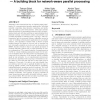383 search results - page 58 / 77 » Matching distributed systems to their environment using diss... |
BCS
2008
13 years 8 months ago
2008
Programs are fragile for many reasons, including software errors, partial failures, and network problems. One way to make software more robust is to design it from the start as a ...
JIPS
2007
13 years 7 months ago
2007
: The use of agent paradigm in today’s applications is hampered by the security concerns of agents and hosts alike. The agents require the presence of a secure and trusted execut...
HPDC
2007
IEEE
14 years 1 months ago
2007
IEEE
Adapting to the network is the key to achieving high performance for communication-intensive applications, including scientific computing, data intensive computing, and multicast...
KDD
2012
ACM
11 years 9 months ago
2012
ACM
Heterogeneous information networks that contain multiple types of objects and links are ubiquitous in the real world, such as bibliographic networks, cyber-physical networks, and ...
ATAL
2009
Springer
14 years 1 months ago
2009
Springer
Self-organising multi-agent systems provide a suitable paradigm for developing autonomic computing systems that manage themselves. Towards this goal, we demonstrate a robust, dece...

